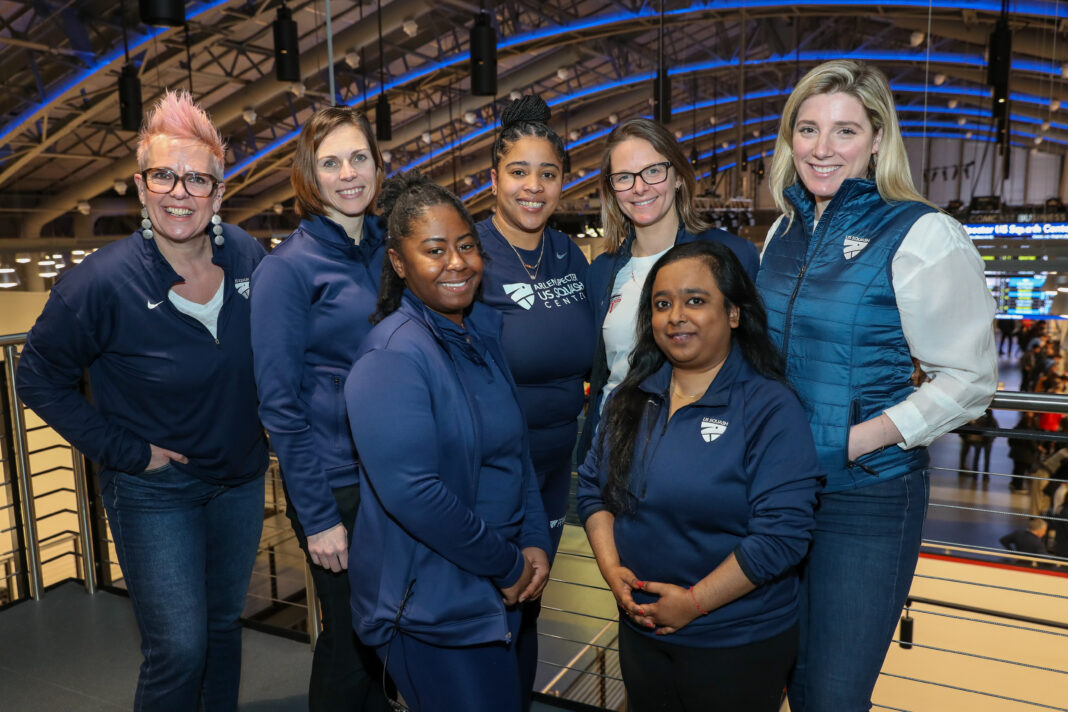Above, (l-r): Linda Elriani, Kimbley Lightner, Donye Hills, Sakora Miller, Brigita Roemer, Monisha Das, Erica Shurmur Simpson. Not pictured: Kim Clearkin, Melinda Berkman, Narelle Krizek, Cece Williams, Ra’elle Harold
Friday, March 8, is International Women’s Day–a global movement to celebrate women’s achievements, raise awareness about discrimination and take action to drive gender parity.
Women and girls play a central role in squash—as players, coaches, leaders, and visionaries. This International Women’s Day, US Squash is celebrating the influential and passionate women who are driving the organization and sport forward.
The Women of US Squash
Melinda Berkman – Chief Financial Officer
Kim Clearkin – Chief Programs Officer
Monisha Das – Manager of Tournament Support Services
Linda Elriani – Senior Director of Professional Development and Programming
Re’alle Harold – Facility Supervisor
Donye Hills – Events & Marketing Manager
Narelle Krizek – Director of Women & Girls Squash and Assistant Director of Advancement
Kimbley Lightner – Assistant General Manager, Arlen Specter US Squash Center
Sakora Miller – Director of Community Squash Programming, Arlen Specter US Squash Center
Erica Shurmur Simpson – Manager, Advancement
Brigita Roemer – Strength and Conditioning Coach
CeCe Williams – Facility & Service Supervisor
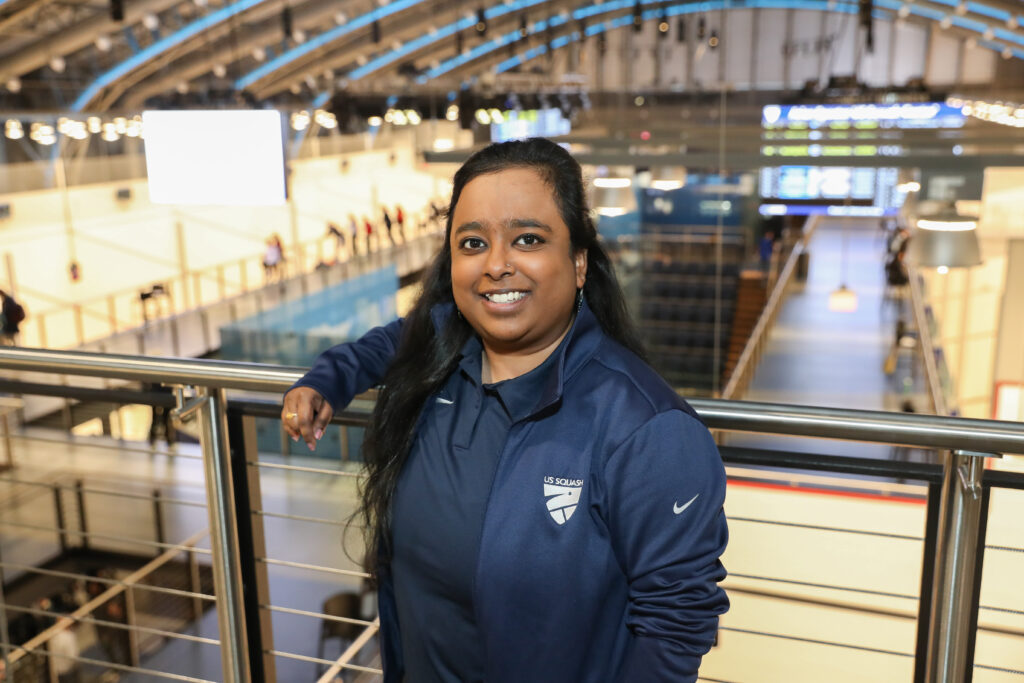
Monisha Das
Manager of Tournament Support Services
Monisha joined US Squash in November 2022 as Manager of Tournament Support Services. Before joining full-time, she worked many tournaments associated with US Squash since 2016 as a tournament operations assistant while completing her undergraduate degree from Drexel University in Philosophy and Psychology. Monisha and her family are originally from Bangladesh but have lived in Philadelphia since 2002, where she was introduced to squash by her elder brother Mithun Das and the SEA program SquashSmarts. Monisha plays a critical role in all US Squash tournaments and National Championships.
Can you tell us about your journey in sports?
My journey in sports began with the influence of my older siblings, both avid soccer players, with one delving into badminton and the other into squash.
What advice would you give to young girls aspiring to pursue a career in sports?
I would encourage young girls to pursue their passion for sports wholeheartedly. If they’re truly passionate about it, they’re capable of achieving great things, and it’s also a wonderful way to maintain their health while pursuing their dreams.
What is your favorite squash memory?
My favorite squash memories revolve around my experiences with SquashSmarts, particularly the opportunities to travel with the team. While my parents didn’t immigrate to the United States from Bangladesh for my involvement in sports and rather education, being part of a team and having supportive staff members who feel like family has been valuable aspects to who and where I am today.
What do you envision for the future of women in sports, and what role do you hope to play in that future?
I envision greater representation and involvement of women in sports, allowing them to become advocates for continued progress and inclusivity. I hope to contribute to this vision by encouraging younger females to explore and fall in love with squash, thus fostering a more inclusive and diverse sporting community.
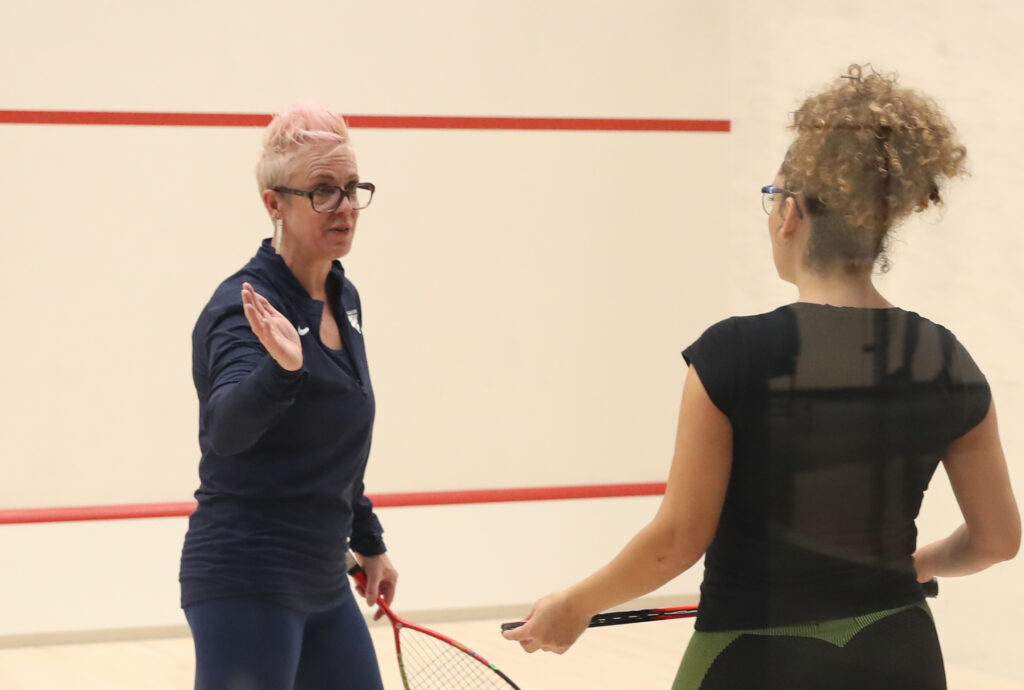
Linda Elriani
Senior Director of Professional Development and Programming
Linda joined the US Squash Team in August 2022 as the Senior Director of Professional Development and Programming. The former world No. 3 grew up playing squash in England and represented her country over 100 times. Linda captained the English national team when they won the World Team Championships in 2000. Linda is passionate about coaching and she moved to the U.S. with her husband, fellow squash pro, Laurent Elriani, in 2006. Linda played a vital role in professionalizing coaching development efforts for US Squash, including the Coach Pass system and expansion of coaching certification courses.
Can you tell us about your journey in sports?
I have always loved all sports from a very young age, watching and participating. I remember as a little girl loving to watch the Olympics and always feeling a little emotional when the Olympic champion would be on the podium receiving their hard-earned gold medal! I personally really enjoyed track and field (particularly the 800m), swimming, netball, field hockey and obviously squash. Once I started playing squash, it took priority over other sports quickly and I wanted to play tournaments and compete. I was so happy when I first got to represent my country at thirteen years old and this really fueled my desire to keep pushing to be the best I could be. Along my squash (and life) journey I have been very lucky to have supportive, positive, and encouraging parents, which I believe has helped immensely towards having the right attitude in the ups and downs of life.
How did you first get involved with squash?
I started playing squash when I was nine years old because my parents played for fun at our local squash club. After an initial hesitance, I tried squash, absolutely loved it, and became completely hooked. Squash has been a gigantic part of my life and has paved and influenced my decisions ever since for where I live, who my friends are and who I fell in love with. I met my husband, Laurent, through both of us being squash professionals and now our son plays and loves it too. Laurent and I have been married twenty years in June!
How long have you been with US Squash?
I started working with US Squash in August 2022 and I am thoroughly enjoying it on many levels. I have worn many hats in squash, from being a junior player, to being a professional player for sixteen years and then coaching and running a large squash program in Brooklyn NY for fifteen years, and now also a parent of a serious player. It’s been great to be involved in squash from another brand-new perspective. Being able to support and influence future initiatives and decisions on a larger scale, to a national and even international audience, is very exciting and fulfilling. I feel I can use my years of experience and expertise in squash and put them back into the game I love.
What advice would you give to young girls aspiring to pursue a career in sports?
I say, go for it girls! I love to see our younger generation of girls competing hard. They are entering into a much healthier sports arena nowadays with parity in prize money and many more opportunities for female athletes in all sports. If anyone has the desire to compete professionally in a sport, I believe they should go for it and follow their dreams. While it may sound like a cliché to say that, you only live once, and you want to be able to look back at your life as you get older and say that you worked hard and tried your best to achieve the goals you set for yourself. Now squash is in the Olympics, there are even larger stages to compete on and so exciting for our future squash players. While I would obviously love to see more money in professional squash for the much deserving players, what is awesome is that squash is such a small supportive world, and most people are only one person away from another person you know!
What is your favorite squash memory?
Some of my favorite memories in squash have been when I represented England. I got over 100 caps for England over the years, in the Commonwealth Games, European Team Championships and World Team Championships. Being the captain of the England team that won the World Team Championships in 2000 was incredible. Squash is mostly an individual sport so to have some chances to play on a team with your friends and teammates was always so fun and gave us much pride to be representing our country. I played professionally for sixteen years so as you can imagine, I have many wonderful memories to reflect on, including becoming No. 1 in England and No. 3 in the world. There were also hard times too of course, but that is part of sport, and they are what make you resilient and appreciate the good times and results when they come around.
What do you envision for the future of women in sports, and what role do you hope to play in that future?
I would love to see more women of all levels and ages happily participating in all sports, especially squash. I would love to see more women coaching squash and leaving college squash to go pro. I hope that through the awareness and initiatives we are creating at US Squash, along with the coaching courses, modules, and resources, that I work on, we can get more women and girls involved and participating in squash. Squash is a lifelong sport and gives participants an automatic community of like-minded people. What can be better than that! Go out there and give squash a try everyone!
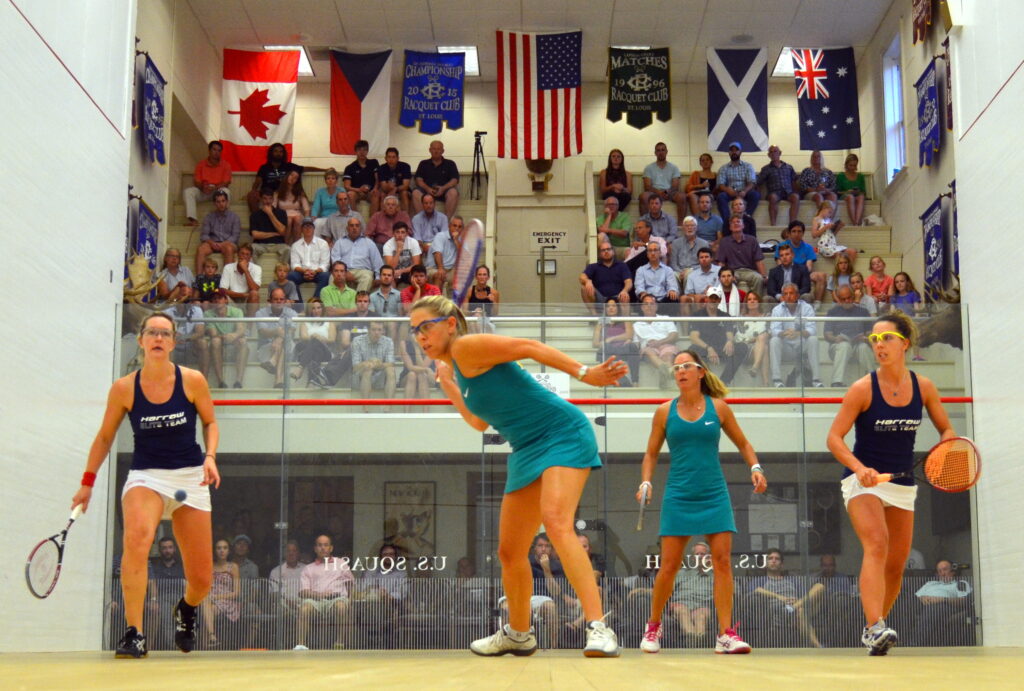
Narelle Krizek
Director of Women & Girls
Krizek brings more than twenty years of experience in squash as a highly accomplished playing and teaching professional, entrepreneur, and mentor. As a junior, she captained the world championship team for Australia, then rose to a career-high adult ranking of No. 23. Narelle moved to the U.S. over two decades ago and has coached juniors and adults at several premier squash programs. In 2007, Narelle founded the Women’s Doubles Squash Association (now the WSDA Tour), the first and only women’s professional squash doubles tour which she ran until 2016. As the Director of Women & Girls, Narelle spearheads the US Squash Women & Girls Initiative and started the Women’s Squash Summit.
Can you tell us about your journey in sports?
I started playing squash when I was very young as well as field hockey. At fifteen I had to make a decision with which sport to pick and chose squash, only because my older sister did and I wanted to be just like her!
How did you first get involved with squash?
When I was little, my Mum wanted a swimming pool at our house in Australia so she took a part time job at a club. The owner loved having my sisters around, so we would always go and when I was two I could hit a ball, or just chase it around. As my sister Tarsh and I got a little older, we were playing leagues at around eight. Then we progressed to playing junior national championships and it became pretty apparent we were good at squash, so my Mum and Dad bought a public club. By the time we were fifteen we represented Australia.
What advice would you give to young girls aspiring to pursue a career in sports?
The most important thing is it needs to be FUN. You can get a lot of enjoyment out of any game, but if you are passionate about the sport it can bring you so much joy, teach you many important lessons along the way and eventually you can inspire younger girls to pick up a sport and see the benefits as well. There are many great career opportunities in sport, find what gives you joy.
If you played, what is your favorite squash memory?
I have been very fortunate to have had many special squash memories: winning the World Junior Team Championships for Australia; winning the US Women’s Doubles Squash Championships with my sister Natarsha (Tarsh)–we were the first siblings to ever achieve that; and getting the chance to play squash with my family–Will, Blake and Rob
What do you envision for the future of women in sports, and what role do you hope to play in that future?
I envision all women and girls feel they have a place to belong. There are many pathways you can participate in, however the community piece is vital as well as having a sense of belonging. I want to encourage all women and girls to try squash, because our community is so welcoming and encouraging. You will find many friends from this amazing sport and along the way get a wonderful workout. You may even become the next Olympic gold medalist in the Squash! I hope everyone around the country learns about squash and they don’t need to ask what it is and that it becomes a common household sport.
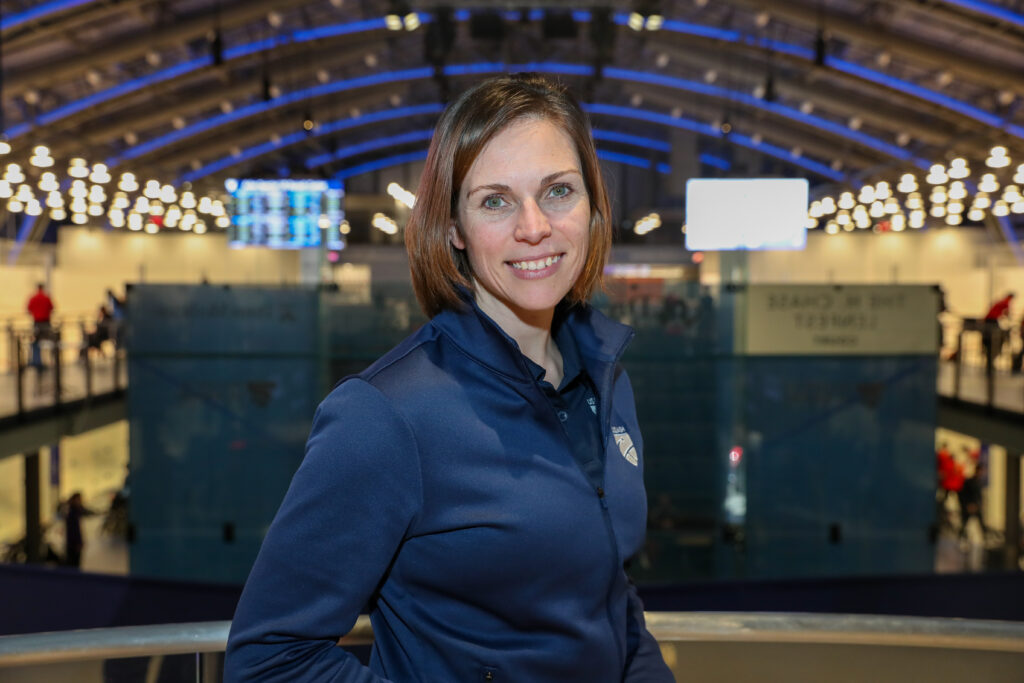
Kimbley Lightner
Assistant General Manager, Arlen Specter US Squash Center
Kimbley joined US Squash full-time in June 2019, and oversees all aspects of operations at the Arlen Specter US Squash Center. Prior to working at US Squash, Kimbley was head coach at the Germantown Cricket club, and played on the Trinity College Varsity team. Originally from Zimbabwe, Kimbley has played squash her whole life and has been involved with US Squash supporting tournaments for over a decade.
Can you tell us about your journey in sports?
Growing up in Zimbabwe, my daily routine involved a forty-five-minute journey to school, where afternoons were dedicated to sports. Throughout elementary and high school, I embraced a multitude of extracurricular activities, fulfilling mandatory requirements while pursuing my passion for staying active. From swimming to tennis, field hockey to cross country, and even dabbling in drama, choir, and orchestra clubs, I eagerly participated in every opportunity that arose. Despite my involvement in various activities, squash emerged as my natural talent, leading to numerous achievements including Zimbabwe Junior National Individual Champion titles and All-African Team and Individual titles during my junior career.
Transitioning to Trinity College in 2005 after being recruited to play squash marked a pivotal moment in my sporting journey. As a starter for the team throughout my four years, I not only excelled on the court but also found myself drawn to administrative roles within the sport. After a brief stint playing professionally, I embraced coaching opportunities at the esteemed Germantown Cricket Club in Philadelphia. Balancing coaching responsibilities with family life became a challenge after the birth of my daughter, prompting a shift towards event management at US Squash. While my playing time may have decreased, my passion for squash and other outdoor sports remains unwavering, fueling my continued involvement both competitively and socially.
How did you first get involved with squash?
When someone asks me how I got into squash, my answer is always; I was born into a heavily involved squash family. My parents were on the Zimbabwe Squash Committee for as long as I can remember, and I picked up the sport from about the age of three years old. Playing my first co-ed tournament when I was seven, and first representing Zimbabwe when I was 8 in the GU11 division was the start of my competitive career.
How long have you been with US Squash?
I’ve been affiliated with US Squash for a span of seventeen years. It all began in 2007 when I started as a volunteer during the US Junior Open hosted by Trinity. This initial involvement ignited my passion for event management, leading me to dedicate many weekends during my senior year in college, to running junior events across the East Coast with the US Squash team. While I temporarily stepped away from US Squash events to focus on my role at Germantown, I reconnected with the organization in 2017, providing regional event support. This eventually led to my appointment as the Director of Tournaments Support Services in 2019. As the Specter Center neared completion two years later, I transitioned into the role of Director of Operations at the facility.
What advice would you give to young girls aspiring to pursue a career in sports?
While sports can present challenges, remember that anything is achievable with determination. The power of the mind to overcome obstacles and the ability of the body to adapt to training are remarkable. With the right mindset, you can accomplish anything you set your sights on in the realm of sports.
If you played, what is your favorite squash memory? If you didn’t what is your favorite memory in sports?
Whether as a player, coach, or event coordinator, it’s challenging to pinpoint a single favorite memory among the multitude of experiences. As a coach, witnessing the growth and success of those I’ve mentored brings immense satisfaction, especially when a child’s passion for the sport becomes evident. As a player, the exhilaration of securing victory with a decisive winning shot or clinching a national title remains unmatched. And as an event coordinator, the joy of seeing players, coaches, and guests depart from a tournament content and fulfilled, knowing that the event ran seamlessly, encapsulates what I cherish most.
What do you envision for the future of women in sports, and what role do you hope to play in that future?
The future of women’s sports could involve greater visibility, investment, and recognition, leading to increased participation and talent development. As the Assistant General Manager of the Specter Center and National Training Facility, I would hope to play a pivotal role in shaping this future by spearheading initiatives to provide top-notch training, resources, and support for female athletes. This could include implementing innovative coaching programs, fostering partnerships with schools and communities to promote grassroots participation, and advocating for equal opportunities and representation in sports media and sponsorship. By championing these efforts, I’d hope to help elevate women’s sports to new heights and ensure a brighter and more inclusive future for all athletes.
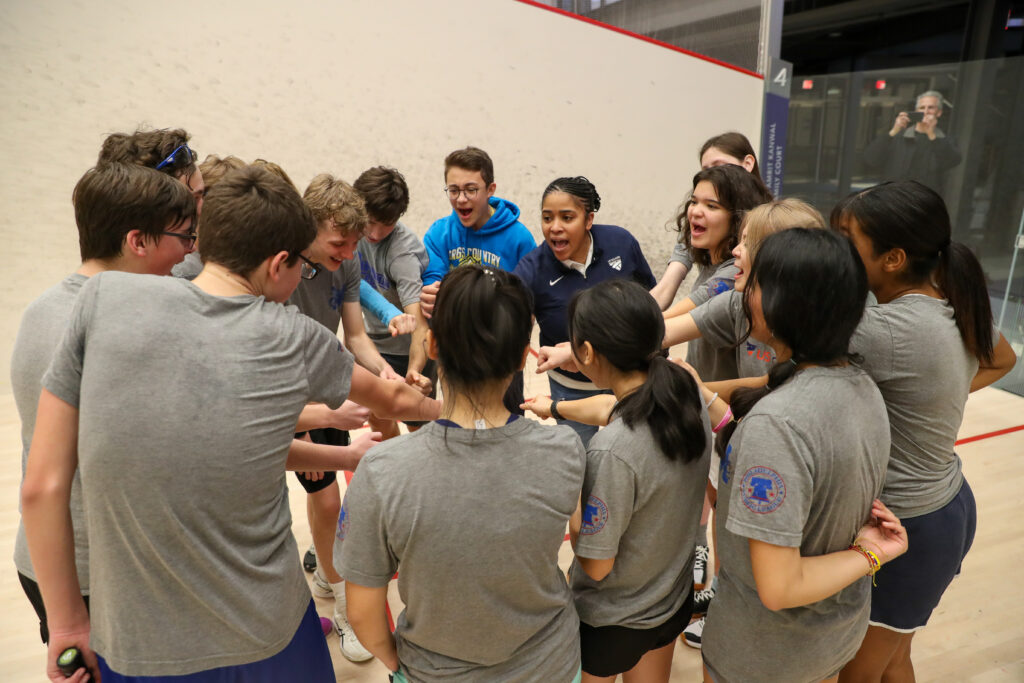
Sakora Miller
Director of Squash Programs, Arlen Specter US Squash Center
Sakora joined US Squash in August 2018 and is responsible for all squash programming at the Specter Center. Prior to working at US Squash, Sakora was the squash director at SquashSmarts, the Philadelphia-based SEA program. Sakora also leads community squash efforts, including working with local schools to introduce squash into the Philadelphia Public League curriculum and the PlayLA Squash Youth Program.
Can you tell us about your journey in sports?
In fifth grade I wanted to be on the basketball team but my mom was too scared to let me play at the local parks because of the violence in the community. So when she heard about a squash program at Drexel University, she made me try out for the team.
What advice would you give to young girls aspiring to pursue a career in sports?
Embrace Opportunities: Be open to trying new sports, techniques, or training methods. Embrace opportunities to compete and challenge yourself against different opponents.
Develop Mental Toughness: Sports can be mentally demanding, so work on developing resilience, focus, and a positive mindset. Learn to manage pressure and stay calm under stress.
Build a Support System: Surround yourself with supportive coaches, teammates, friends, and family members who believe in you and encourage you to pursue your dreams.
Educate Yourself: Learn about the business side of sports, including contracts, sponsorships, and media relations. Knowledge in these areas can help you navigate your career more effectively.
What is your favorite squash memory?
I was the first person in my family to travel outside of the United States when in 2010 I had the privilege of attending a squash summer camp in England.
What do you envision for the future of women in sports, and what role do you hope to play in that future?
The future of women in sports holds immense promise for greater recognition, equity, and participation. I hope to facilitate partnerships and collaborations that prioritize gender equality and the advancement of women in sports.
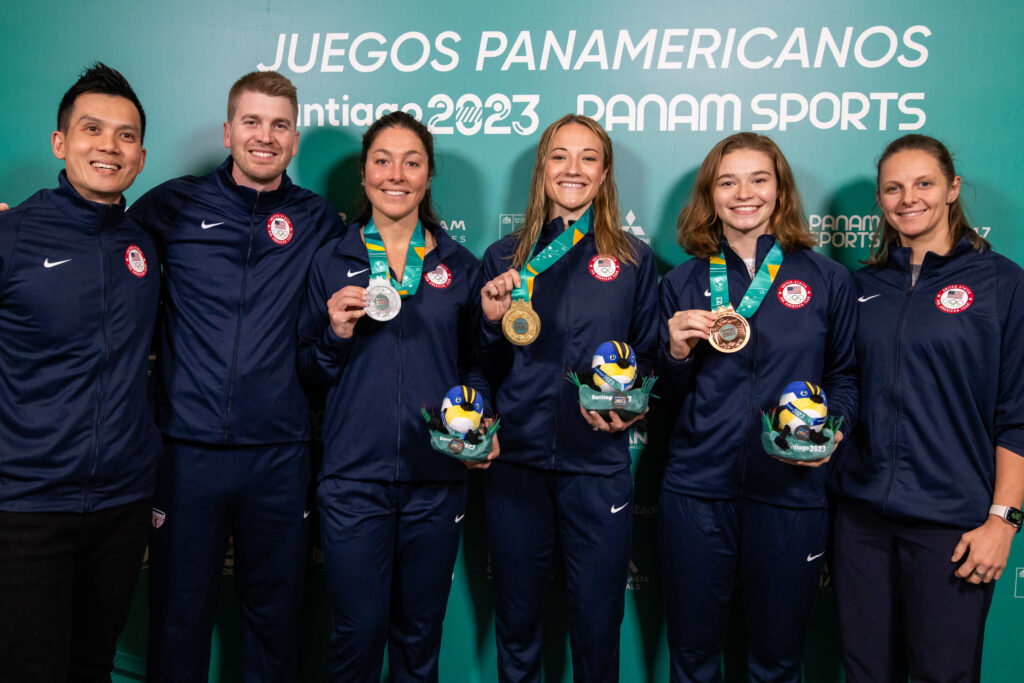
Brigita Roemer
Strength & Conditioning Coach
Brigita works daily with members of Team USA at the Specter Center to prepare them to excel on the international stage by implementing research supported and sports specific methods for injury reduction and strength and conditioning training.
Can you tell us about your journey in sports?
I was fortunate enough to have grown up in a family of coaches. My grandpop still coaches the jumps for the Olympic Team in Lithuania, my grandma was one of the inaugural gymnastics coaches in Lithuania and my dad is a world renowned choreographer. I was raised by amazing coaches and therefore sports has always been a massive part of who I am. I was a track and field athlete most of my life with some gymnastics and MMA sprinkled in. I competed in the long, triple and high jump at the College of New Jersey earning All-American Honors in the high jump.
How did you first get involved with squash?
I had the privilege of working with Drexel Athletics in their Strength & Conditioning department for 5 years. It was an experience that truly shaped me as a coach not only because I got to work with some of the most dedicated, hardworking, and kind athletes but had the support and mentorship of Mike Rankin and Anthony McCloskey in the S&C room. Amongst other sports, when I started, I was tasked with developing the Squash team and quickly, they grew to be one of my favorite teams to work with. I was constantly in awe watching matches and learning how many physical differing qualities it took to be successful. On top of that, the team was incredibly dedicated in their pursuit of excellence and many years were the first ones on the Iron Dragon board. Naturally, when I got the opportunity to interview for an interim part time role at the new Arlen & Specter center, I jumped at it. The rest as they say, is history.
What advice would you give to young girls aspiring to pursue a career in sports?
You are allowed to take up space and be yourself, do not ever cower to validate someone else’s insecurities.
If you played, what is your favorite squash memory? If you didn’t what is your favorite memory in sports?
One of my favorite memories as a coach was at the Pan American Championships in Cartagena last year. It was some of the most brutal conditions our athletes have ever played in with 80% humidity, 90+ degree heat and the courts were outside. The way they all came together as a team, supported and battled for each other was truly something to be admired. It made me incredibly proud to be a part of this organization and to have the privilege to work with our athletes.
What do you envision for the future of women in sports, and what role do you hope to play in that future?
I am hoping that I can influence and guide the current perception of strength training in squash for female athletes. There are many misconceptions that are still prevalent today that need to be changed in the interest of injury reduction, athletic success, life-long commitment to physical activity and character building.

